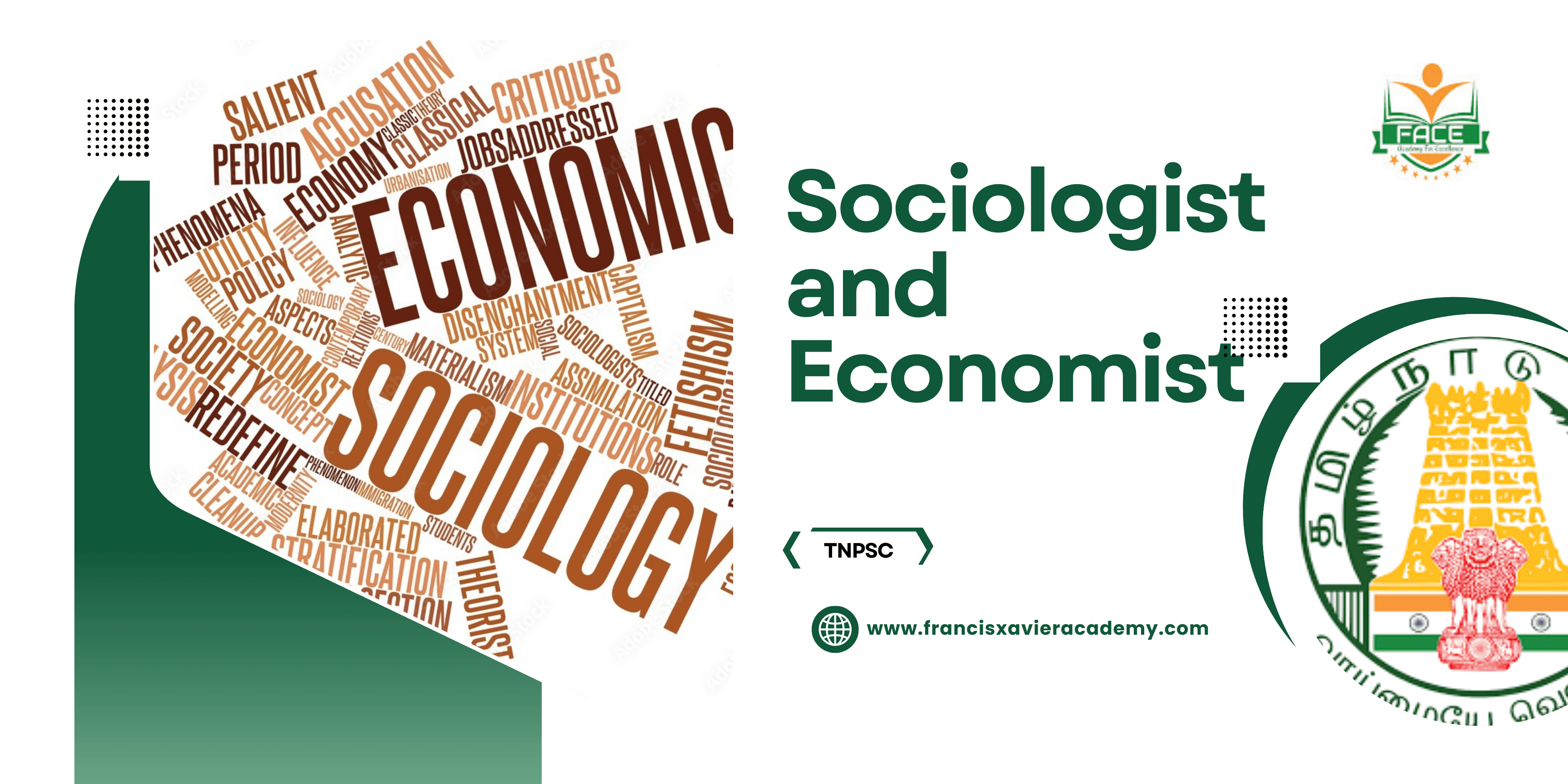
Sociology Syllabus (P.G. Degree Standard, Subject Code: 344)
1 : Nature and Scope of Sociology
- Definition, Nature, and Scope of Sociology.
- Relevance of Sociology.
- Sociology’s relationship with other social sciences: Anthropology, Psychology, Economics, and History.
2 : Theoretical Perspectives
- August Comte: Law of Three Stages, Social Statics, Dynamics.
- Herbert Spencer: Organic Analogy, Theory of Evolution.
- Emile Durkheim: Social Facts, Solidarity, Suicide.
- Karl Marx: Economic Determinism, Class Struggle, Alienation.
- Other Thinkers: Pareto, Simmel, Parsons, and Max Weber.
3 : Socialization and Social Groups
- Processes of Socialization.
- Associative and Dissociative Processes.
- Agencies: Family, Religion, Education, Media.
- Social Groups: Primary/Secondary, In/Out Groups.
4 : Social Stratification and Social Control
- Types of Stratification: Caste, Class.
- Social Mobility: Factors, Barriers.
- Tribes in India: Socio-Economic Aspects.
- Role of Education in Development.
5 : Rural and Tribal Society
- Rural Community: Socio-Cultural Aspects, Problems (Poverty, Illiteracy).
- Development Programs for Rural and Tribal Areas.
- Tribal Welfare and Constitutional Safeguards.
6 : Urban Society
- Urbanization and Related Issues: Slums, Housing, Health.
- Juvenile Delinquency, Urban Crimes, Drug Addiction.
- Urban Planning and Development Strategies.
7 : Social Change
- Theories: Evolutionary, Conflict, Cyclical.
- Processes: Modernization, Globalization.
- Legislative, Executive, and NGO Roles in Change.
8 : Social Movements
- Types and Characteristics of Movements.
- Movements in India: Dravidian, Dalit, Trade Union, Women’s Movement, Environment Movement.
9 : Social Demography
- Demographic Transition.
- Variables: Fertility, Mortality, Migration.
- Population Size, Growth, and Policies.
10 : Social Problems
- Issues: Crime, Child Labor, Unemployment, Gender Injustice.
- Communal Violence and Corruption.
Economics Syllabus (P.G. Degree Standard, Subject Code: 249)
1 : Importance and Scope of Economics
- Micro vs. Macro Economics.
- Consumer Behavior: Indifference Curves, Revealed Preference, Elasticity of Demand.
- Consumer Surplus.
2 : Theory of Production and Cost
- Production Functions (Cobb-Douglas, CES, etc.).
- Cost Analysis and Break-Even Point.
- Price Determination in Market Structures.
3 : General Equilibrium and Welfare Economics
- Nash Equilibrium, Pareto Optimality.
- Welfare Criteria: Kaldor-Hicks, Arrow’s Theorem, Rawls’ Justice Theory.
- Input-Output Analysis.
4 : National Income and Employment
- Measurement and Challenges.
- Classical and Keynesian Theories.
- IS-LM Model, Business Cycles, Multiplier, Accelerator.
5 : Economic Systems and Development Approaches
- Types of Economies: Market, Command, Mixed.
- Theories by Smith, Ricardo, Marx, Gandhi, Ambedkar.
6 : Money, Banking, and Inflation
- Theories: Friedman, Tobin, Baumol.
- Banking Systems and Money Supply in India.
- Inflation and Deflation: Causes, Control Measures.
7 : International Trade and Organizations
- Trade Policies: EXIM, WTO, GATT, TRIPS, TRIMS.
- International Institutions: IBRD, IMF, UNCTAD.
8 : Fiscal Functions and Budgeting
- Taxation, Public Expenditure, Debt Management.
- Fiscal Federalism in India.
- Types of Budgets and Formulation.
9 : Economic Development
- Agricultural Trends and Green Revolution.
- Role of Public and Private Sectors.
- Social Security and Rural Industrialization.
10 : Planning and Economic Policies
- Types of Planning, Models in Indian Plans.
- Liberalization, Privatization, Globalization.
- Sustainable Development (MDGs to SDGs).
Paper-II: General Studies (Degree Standard)
1 : General Science
- Physics: Mechanics, Electronics, Space Science.
- Chemistry: Acids, Metals, Biochemistry.
- Botany & Zoology: Life Processes, Biodiversity, Human Health.
2 : Current Events
- National Symbols, Sports, Awards, Eminent Persons.
- Indian Foreign Policy, Government Schemes, and General Administration.
3 : Geography
- Earth and Universe, Natural Resources, Disaster Management.
- Climate Change, Pollution Control.
4 : History and Culture of India
- Indian History from Indus Valley to Independence.
- Tamil Nadu’s Role in Freedom Struggle.
5 : Indian Polity
- Constitution, Judiciary, Civil Services, Elections.
- Anti-Corruption Measures, Empowerment, Consumer Rights.
6 : Indian Economy
- Five-Year Plans, Industrial Growth, FDI, Globalization.
- Energy Resources and Sustainable Development.
7 : Indian National Movement
- Early Uprisings, Key Leaders, Gandhian Movements.
- Role of Tamil Nadu in the Freedom Struggle.
8 : Aptitude & Mental Ability Tests
- Data Interpretation, Logical Reasoning, Problem Solving.
- Simplification, Ratios, HCF/LCM, and more.
How to Tackle the Sociology Syllabus with Francis Xavier Academy
Preparing for competitive exams like the Combined Library State/Subordinate Services Examination requires structured planning, consistent effort, and expert guidance. Francis Xavier Academy, renowned for its exceptional results, provides the perfect platform for aspirants to excel.
Study Strategy for Success
Stay Updated
Keep up with current events and general studies topics by referring to Francis Xavier Academy’s curated resources and live sessions.
Create a Study Schedule
Allocate dedicated time for each unit, ensuring balanced preparation across all subjects.
Use Quality Resources
Francis Xavier Academy offers specialized textbooks, online resources, and tailored study materials that align with the syllabus for Sociology, Economics, and General Studies.
Practice Regularly
- Solve the academy’s 1,000+ model questions.
- Take full-length mock tests to build confidence and improve time management.
- Analyze previous years’ question papers for trends and frequently asked topics.
 Now
Now